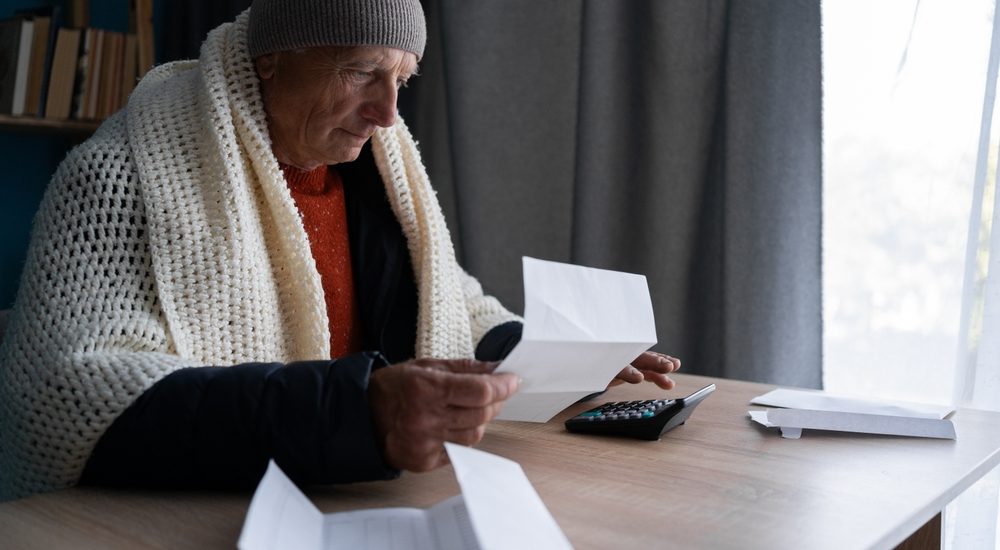Contact: Nick Palmer, Press and Media Officer Email: nick.palmer@nea.org.uk or Mobile: 07596 858 719
- Ahead of this Wednesday’s Budget, fuel poverty charity National Energy Action (NEA) says Chancellor must help poorer households who face high energy bills balance their own ‘negative budgets’ this winter
- It says the Chancellor should use new revenues from VAT on soaring energy bills and carbon taxes to help over 2 million households heat and power their homes this winter
- Without additional help, NEA says increases in the cost of living will drive millions of households into more utility debt. This will put further strain on energy suppliers as well as increasing the risk of serious ill-health this winter
Adam Scorer, Chief Executive at fuel poverty charity NEA, says:
“With the cost of living soaring, the Chancellor needs to take action for millions of people who will desperately try to balance their own negative budgets this winter, especially as they face high energy bills.
“The Chancellor talks about ‘fiscal responsibilities’. However, the tax taken from VAT on soaring gas prices and higher carbon taxes this winter gives him the resources to help more than 2.4 million households across the UK who are struggling with high energy bills. Treasury coffers could be boosted by as much as £100 million directly through VAT receipts on rising energy prices. ‘Carbon tax’ revenues have also risen sharply because of the gas crisis, adding an additional £1bn in revenue to the Treasury. That’s on top of £4bn already made this calendar year.
“It would take only a small proportion of these resources to open up Winter Fuel Payments to vulnerable working age households. Unlike the Household Support Fund, this would directly provide automatic relief to help with high energy bills this winter. This is especially important in Northern Ireland, where households are not protected by the energy price cap or GB schemes like the Warm Home Discount. According to the N.I. Utility Regulator, households there could also be hit by a further increase in gas bills, possibly up to 50% in December. The UK Government should also be considering how to directly help accelerate the repayment of utility debt by funding or encouraging payment matching schemes.
“This emergency support will help millions of households get through this winter. Without it, they will just sink further into debt as they struggle with high energy bills. Or they could be forced to turn off the heating, leaving them at acute risk of serious ill-health as we get into winter.
“Soaring gas prices have gifted the Treasury a huge tax windfall. The Chancellor’s true ‘fiscal responsibility’ should be to use those resources to support households who live in dread of this winter”.
-ENDS-
Notes to editors
- NEA works across England, Wales and Northern Ireland to ensure that everyone in the UK can afford to live in a warm, safe home. For more information visit https://www.nea.org.uk/
- According to End Fuel Poverty Coalition over 4 million people are already estimated to be behind on their household bills and the high energy bills resulting from the rise in October 2021 to the GB price cap saw an additional 524,000 households in fuel poverty. NEA has highlighted a bigger increase in April next year could result in a further 1.2 to 1.5 million more households struggling to heat and power their homes.
- 5% VAT is applied to gas and electricity bills. In a typical year this generates the HMT c. £1.5-2bn per annum. NEA estimates the recent rise in October 2021 to the GB price cap will result in an additional of over £100m per year. HMT also receive a substantial revenue from both the UK Emission Trading Scheme and the in Northern Ireland the EU Emission Trading Scheme. The gas crisis has pushed the carbon price up for the UK ETS by c. £15/certificate since September. If the crisis carries through to April, that will result in an additional £1bn in revenue, added to the c.£4bn already collected this calendar year.
- In Northern Ireland gas bills have increased in October in the Ten Firmus Gas Towns Network area by 35% and by 33% in greater Belfast and a further 178,000 customers saw bills rise by 21.8% when SSE Airtricity increased its gas prices for households and small businesses at the start of October adding £112 on to the typical average household bill. Power NI, which has a regulated price, has also increased its main electricity tariff by 6.9% in July.
- On 20 October the N.I. Utility Regulator warned households in NI could be hit by a further increase in gas bills, possibly up to 50% in December and consumers could also expect regulated electricity prices to increase by up to 20% in January.
- The Winter Fuel Payment provides a significant amount of support each winter for pensioners to stay warm. Unlike the GB price cap and Warm Home Discount, the WFP is also available in Northern Ireland. The WFP is paid to nearly all pensioners across the UK to provide extra help with heating bills. Its key advantage is it helps low-income pensioners not on benefits, but it is relatively poorly targeted, with everyone over 66 receiving the payment, regardless of their income or wealth. The Committee on Fuel Poverty (CFP) have noted that taxing the benefit would raise approximately £200 million and this could be recycled to reach more households most in need.
- NEA is calling for the WFP to be expanded to those eligible for ‘Cold Weather Payments’. The CWP is broadly the same cohort who are eligible for the Warm Home Discount, these households include households in receipt of Pension Credit, Income Support, Income-based Jobseeker’s Allowance, Income-related Employment and Support Allowance and Universal Credit.
- NEA estimates that our proposals would lead to approximately 2.4 million households receiving the Winter Fuel Payment. The payment they receive should be at the higher end of the scale, at £300 due to the significant risks this winter, and the vulnerability of the groups being supported.
- Last winter Public Health England (PHE) warned there is a damaging overlap between the health impacts of living in a cold home and Covid-19. Pre-existing chronic medical conditions such as cardiovascular and respiratory conditions, such as chronic obstructive pulmonary disease (COPD), asthma and heart disease are particularly badly affected by a cold home.
- NEA has submitted its views on how to address the energy crisis to the UK Government within its Budget submission and highlighted its Spending Review priorities for energy efficiency. On 19 October the UK Government published its long-awaited Net Zero strategy and Heat and Buildings strategy, which set out the funding for decarbonising our homes over the next three years. NEA warned that investment is less than half of the funding pledged within the Government’s 2019 manifesto for the poorest households in the least efficient homes.





